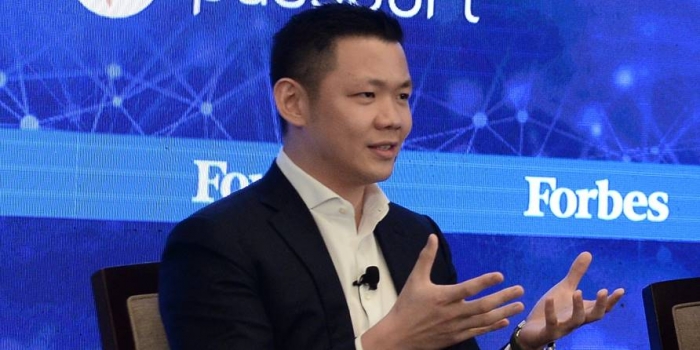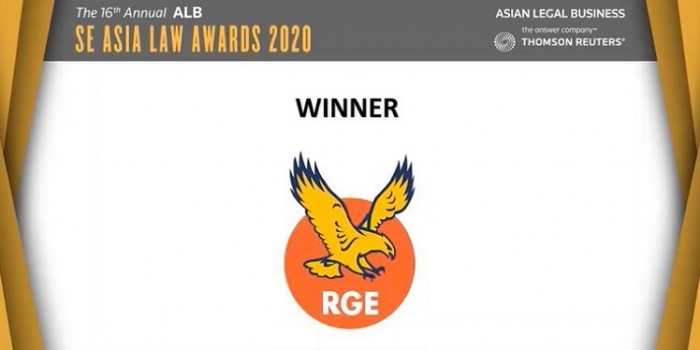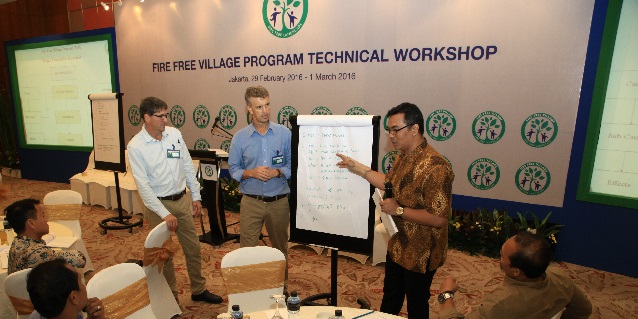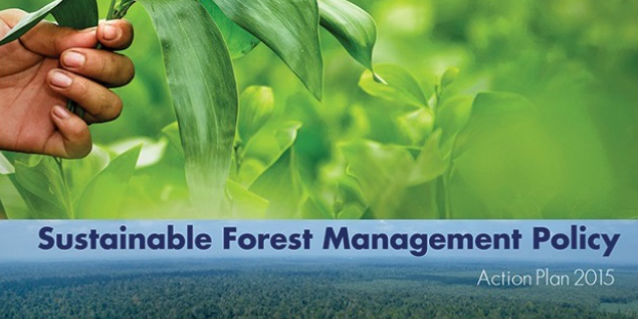RGE Director Anderson Tanoto joined an eclectic crowd of entrepreneurs, investors and business leaders at the Forbes Asia Forum: Decrypting Blockchain for Business to explore the finer points of business applications for blockchain. Held at the Fullerton Hotel in Singapore on December 4, 2018, Tanoto served as a panelist on the “Once on the Block, Forever on the Chain” session focusing on real-world applications, emerging developments and potential applications for the future.
Anderson Tanoto touched on the potential and applicability of blockchain technology in the agri-commodity industry, and also shared thoughts on blockchain’s use in area of philanthropy (which will be shared in a future Inside RGE post).
Here are Tanoto’s takeaways from the event.
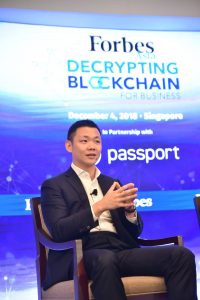
“I see blockchain as more an industry application than a business application” – Anderson Tanoto.
A year and a half ago, I would not have imagined myself attending a blockchain event, let alone be an invited panelist. However, coming from the agri-commodity industry – a very competitive industry with its complex challenges – the last thing we want is to be left behind and not adapt to the latest technologies.
We launched SUSTAIN in early September this year as multi-stakeholder collaboration to improve supply chain traceability in the palm oil Industry. This initiative has gained good traction among upstream, midstream and downstream companies, for as an industry, we not only share the same challenges but also the urgent desire to address them.
While palm oil comes from 7% of the land in the world used for vegetable oil cultivation, it accounts for about 32% of the global edible oils and is used for a wide variety of day-to-day applications. Indonesia produces half the world’s palm oil, and half of that amount is produced by its smallholders – all 1.5 million of them.
So how can we collectively tackle the challenge of tracing these 1.5 million smallholders across the supply chain all the way to the products that we use daily?
A Solution Adapted for the Industry
I was asked at the panel discussion how blockchain could be a business application. I believe it is more important to first identify and scope the challenges we face. The mechanics of the solution has to be adapted to the complex nature of our industries.
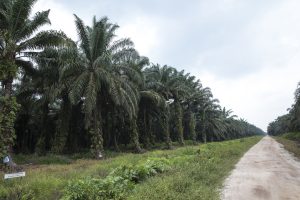
“The mechanics of the solution has to be adapted to the complex nature of our industries… We have a business urgency to continue with sustainable development and lead in traceability.”
There are three important considerations from the business viewpoint. First, we are in agri-commodities for the long haul. We plant 125 to 140 oil palm trees per hectare, and they take about 40 months before their fruits are harvested – with higher quality seeds, about 28 months. The planting / harvest cycle for oil palms range spans 25 years. This is not an industry for those looking to make a quick buck.
Second, we work very closely with many different stakeholders across the supply chain. Demands for sustainable and deforestation-free palm oil are continually heightened from NGOs, customers, governments and others. However, while many large organisations have committed to achieving full traceability and sustainably sourcing by 2020, a lot of them still work in silos, developing their own systems and own sets of data requirements. If we took a broader view of these development, we would notice the misalignments and redundancies, and that a lot of money has been spent. More can definitely be done for the benefit of the industry, in a more effective manner.
Third, because of the first two points, we have a business urgency to continue with sustainable development and lead in traceability. As a business, we are responsible to our tens of thousands of employees, as well as the communities and environments in which we operate. Any compromise in these areas will greatly affect us.
With these contexts considered, I see blockchain as more an industry application than a business application. The interests of stakeholders across the supply chain may vary and occasionally overlap, but the concerns and challenges in traceability are shared. Shared challenges demand for a shared commitment to collectively address them.
Narrowing the Trust Deficit
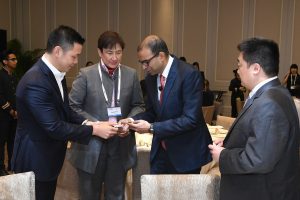
Tanoto meets Dr Janil Puthucheary.
Imagine if we could trace and account from plantation to supermarket shelf, using a technology that is decentralised and immutable. It will be game-changing. Not only will consumers be aware that the products they use have been responsibly sourced, but the industry also benefits from narrowing the “trust deficit” that has chronically plagued it.
Dr Janil Puthucheary, Singapore’s Senior Minister of State at the Ministry of Communications and Information and the Ministry of Transport, was a speaker at the same forum, and used “trust deficit” to contextualise the sociopolitical landscape and the opportunities technology provides us. That term resonates with me as a stakeholder in the agri-commodity industry; in fact, it applies to many industries with complex nodes of stakeholders. Blockchain can be that common platform for establishing this inter-nodal trust; a trust that in turn strengthens the veracity of the platform, and only from that development will we be able to build inter-nodal accountability.
Trust remains an important element in the entire transformation process. Blockchain verifies this trust. These changes take time and whole-hearted commitment. As such, an attitude change at all stages in the value chain is necessary for adopting blockchain.
Adopting Blockchain
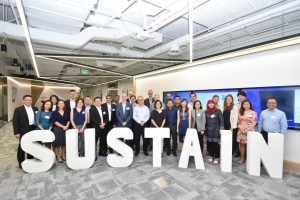
The SUSTAIN allies stand together to leverage blockchain technology for progressive transformation to the industry.
We are not focused on transformation for the sake of it. It is intrinsic to our business to constantly ask questions such as: What more can we do to effectively ensure resources are sustainably developed and responsibly produced?
Through SUSTAIN, our RGE companies Asian Agri and Apical are exploring with Kao, Neste and SAP how we can implement a scalable application that narrows the “trust deficit”, paving the way to improve industry accountability, governance and regulation.
I shared at the forum that blockchain adoption is low-cost and its application does not have to be very complex. We have built stronger enterprise digital competencies in our organisation over the years as transformation is integral to our business, and I urged fellow business leaders who are unsure of blockchain adoption to have a good conversation with their CIOs, CTOs, CDOs and consultants. We should not shortchange ourselves by passing up on new opportunities to address prevailing as well as emerging challenges in our businesses and industries.
The finance industry may see early adopters of blockchain technology attempting to consolidate their first-mover advantage. I believe the agri-commodity industry can actually enjoy second-mover advantage. As an upside to having second-mover advantage, we are exposed to a wide spectrum of applications and use cases across other industries; and without having to reinvent the wheel, blockchain can then be applied not only at a lower cost but in specific domains like traceability.
The next big step is securing industry-wide buy-in, the will of stakeholders to commit to this common platform, and the business urgency to get other stakeholders on board. I shared my thoughts at the beginning of the panel discussion that there are two groups of people in blockchain – those who want to get rich off crypto, and those who want to change the world with blockchain. I believe it is critical that we align ourselves with the latter.



